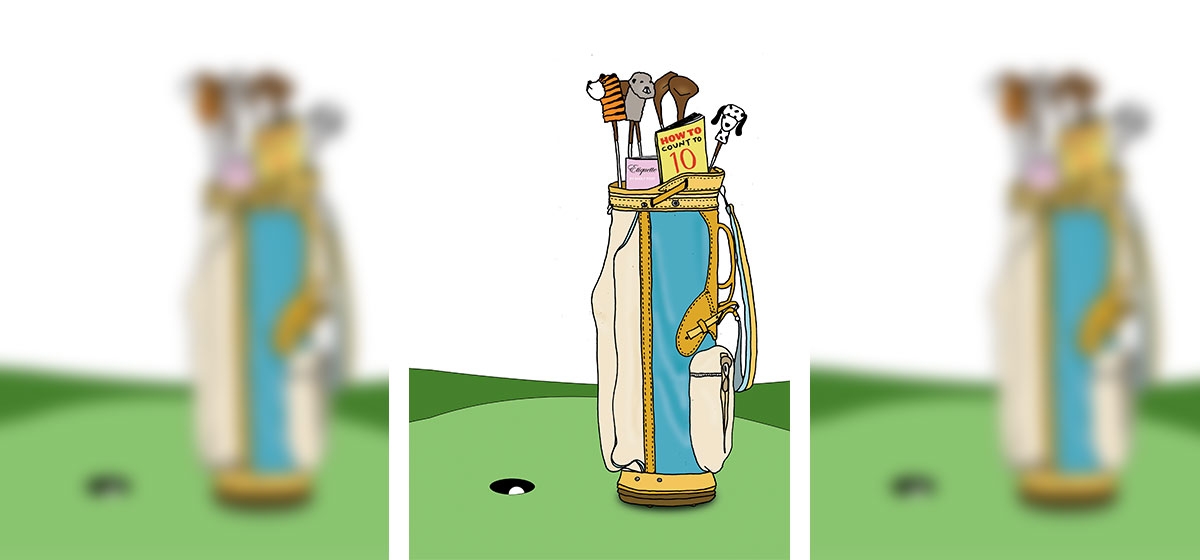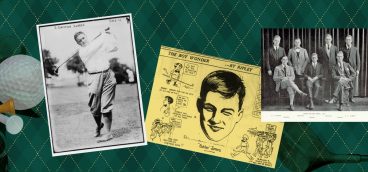
Mark Twain referred to golf as “a good walk spoiled.” I think of golf as more of a journey of revelation. It reveals whether you really want to do business with someone as you watch his behavior during a round. Or, as an unknown golfer said, “If there is any larceny in a man, a golf game will bring it out.”
On a basic level, executives golf with customers and business associates because it gives them four hours of uninterrupted time together, a rarity in our frenetic world of Blackberries, GPS systems and constant access. In those four hours, some basic elements of human nature surface: your propensity to lie, cheat and steal; how you approach life in general; how courageous and determined you are; and, finally, whether you take yourself way too seriously.
I undertook the game when well into my 40s, which some say is a huge mistake. While I practice a lot, I’m not very good. But I am observant, and I like watching people as they play. Mostly, they make me laugh. Not because of their lack of proficiency (people in glass houses, etc.). No, I find hilarity in their constant effort to fool others and themselves.
The ability to count, literally
The first and most basic thing that will help you decide if you want to jump into bed with someone on a business deal and not get more than a good night’s sleep is how an associate scores his game.
We’ve all played with a few golfers who are arithmetically challenged. Some of these math-plagued golfers may also be long or large off the tee, which means that they can hit the crap out of it. That typically means a tee shot approaching 300 yards. “Long” or “large” hitters can sometimes be errant as well. Sometimes, the shot is so awry that it goes out of bounds (OB).
If a golfer suspects he’s OB, it is sometimes wise to take another,provisional, tee shot just in case you can’t find the ball from the first tee shot. Inthat event, you should score the second tee shot as though it is your third shot. You count the first shot off the tee, aswell as a penalty stroke for being OB. Therefore, your second tee shot is actually your third shot, sometimes called “hitting three.”
Often, when someone completes a hole, he “forgets” he was hitting three. And you ask yourself: If someone is less than forthright about something as trivial as a golf score, how would they treat expense reports or honor a verbal deal? As golfing great Jimmy Demaret said, “Golf is based on honesty. Where else would you admit to a seven on a par three?”
Taking your turn
Playing properly is more critical than playing well. I’ve always imagined that the person who developed golf etiquette was reading the New Testament’s Book of Matthew, which states, “so the last shall be first, and the first last: for many be called, but few chosen.”
The golf translation would be, “Hey, dummy, It’s my turn and I don’t care if you want to finish that one out.”
After someone hits a tee shot, or a second shot or is putting on the green, the person farthest away from the hole shoots first. And the person who wins the previous hole gets to tee off first. That is called “having honors.”
Avoid making noise or moving around when someone is preparing to swing the club or make a putt. Turn your cell phone off.
It’s all a real estate issue. When it’s your turn, the line from your ball to the hole is your real estate, albeit only for a moment. And if someone disrespects your “property rights,” what else might he do? Or as Jack Lemmon once said, “If you think it’s hard to meet new people, try picking up the wrong golf ball.”
Focus, temper and adversity
The best thing about golf is that it shows someone’s character. It also clarifies a person’s priorities. Compared with taking care of your family, golf is just a game, isn’t it?
The golfer of all golfers and probably the game’s greatest gentleman, Bobby Jones, famously talked about a person’s ability to focus: “Golf is a game that is played on a five-inch course — the distance between your ears.”
You can discern a colleague’s ability to persevere when he soldiers on despite a bad start to a round. I am impressed by people who shake off a bad shot and hit a great next shot. And I am more impressed if they can laugh at themselves and don’t spoil this good walk.
A bad temper on a golf course can be funny, as in the case of Craig “The Walrus” Stadler, who once said, “Why am I using a new putter? Because the old one didn’t float too well.” You can see poise or its absence pretty quickly on a golf course.
Would they drag the ball out ofhigh grass to make the shot easier — a laEnron and off-balance-sheet partnerships? Or would they play the cards they’ve been dealt with grace and aplomb — a la Johnson & Johnson and the 1982 Tylenol scare?
Bobby Jones died of a debilitating illness called syringomyelia, which left him weighing between 60 and 90 pounds when he died in 1971. The illness withered him over many years and left him in a wheelchair. Of it, he said, “I will tell you privately it’s not going to get better, it’s going to get worse all the time, but don’t fret. Remember, we ‘play the ball where it lies,’ and now let’s not talk about this, ever again.”
The golfer I admire most is a recent devotee of the game. Frank Catanzanohas also been recently diagnosed with Parkinson’s disease.
He was once my boss at Mangus, Catanzano & Skaare and now he is my friend. During the years I worked for him, he was a rabid physical-fitness junkie. He was also a black belt in karate. His inspiration got me into physical fitness more than 20 years ago. We worked out together almost every day that I worked for him.
His doctors believe his devotion to exercise probably beat back the disease for much longer than is normal. It also may have made it undetectable for many years.
Since his diagnosis, he hasn’t been able to work out as aggressively as he once did. But he has been able to golf. And in a short year, he has developed an impressive game.He is good humored about a bad shot. He recovers quickly. And he records every stroke because he is adamant about improving his score. (This is a guy who has recorded the details of every workout since the 1970s.)
When I learned that he had become an avid golfer, I invited him to play at my country club. As we approached the first hole, he pulled out a copious set of notes on each hole. Apparently, he went on the club’s web site, studied every hole and planned out exactly how he would play each one, down to yardage, position and club selection.
My friend is using his game to slow a terrible disease. It is giving him hope.
He may not be as physical as he once was, but he remains active and in good spirits. He is “playing the ball where it lies.”
I’d do business with a guy like that in a heartbeat.





